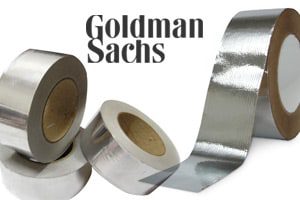
Federal regulators just subpoenaed Goldman Sachs over a warehouse debacle in which the financial powerhouse is accused of inflated aluminum prices. The Commodity Futures Trading Commission issued the subpoenas to Goldman and other major warehouse owners as part of its probe into issues in the aluminum market that have led to customer losses in the […]
 Federal regulators just subpoenaed Goldman Sachs over a warehouse debacle in which the financial powerhouse is accused of inflated aluminum prices.
Federal regulators just subpoenaed Goldman Sachs over a warehouse debacle in which the financial powerhouse is accused of inflated aluminum prices.
The Commodity Futures Trading Commission issued the subpoenas to Goldman and other major warehouse owners as part of its probe into issues in the aluminum market that have led to customer losses in the billions of dollars since 2010, according to The New York Times.
Goldman Sachs Group Inc. has been named in a United States class action lawsuit brought over allegations tied to the aluminum price inflation. In fact, the price hikes may be the start of an aluminum buyers’ legal fight against Goldman Sachs and other warehouse owners, anti-trust attorneys recently told The Huffington Post. The class action names the London Metal Exchange (LME), Goldman Sachs, and other warehouse owners as defendants in the recently filed lawsuit that alleges anti-competitive behavior. LME owner HKEx and Goldman Sachs say the litigation has no merit and are fighting the claims. The LME, the Times explained, is a private trade association responsible for regulating warehousing.
The subpoenas are seeking all internal documentation—emails, correspondence—voice records, and other records relating to warehouse operations as far back as January 2010, and also seek documents and correspondence related to LME, two people familiar with the paperwork told the Times. According to the Times, the subpoenas indicate that there are 30 “areas of interest.”
In 2010, Goldman purchased Metropolitan International Trade Services—a group of Detroit metals warehouses. Soon after the purchase, the beverage industry voiced concerns that Goldman was limiting the release of metal, which led to long delivery delays. The delays, which were about six weeks in 2010 are now up to about 16 months, according to the Times. These delays led to increased costs for metal owners who must pay rent on a daily basis.
It seems that due to some formulaic glitch, the higher aluminum prices impacted all manufacturers, regardless of whether or not they purchase warehouse-stored metal. The estimated costs, analysts and beverage producers say, is about $5 billion dollars, the Times reported. Following a Times report that Metropolitan was paying an incentive to metal owners to move the metal from one warehouse to another, which added to delays, regulators started to look at the warehouses in July.
“Antitrust exposure is not limited merely to government enforcement but also to private enforcement,” Daniel Sokol, who writes about competition and antitrust law at the University of Florida, told The Huffington Post. Should a defendant in the matter be found liable, the exposure could be quite significant because price-fixing damages are tripled under U.S. law, Sokol noted.
According to lawsuit allegations, warehouse owners enjoyed “extraordinary revenues from inefficiencies and deadweight restraints on the economy,” reflecting their “extreme monopoly pricing power and abusive agreements in very unreasonable restraint of trade.” Britain’s financial watchdog is also investigating LME, the Huffington Post reported.
Creating a price for a product or service, while also not allowing that price to be determined through free market activities, is price fixing. Under certain situations, anti-trust laws make price fixing illegal.


